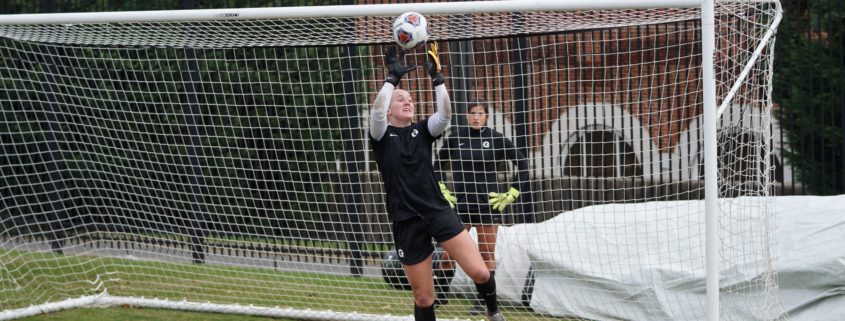How to Be A Good Soccer Goalkeeper?
Although soccer is a team game where everyone from the 11 playing ones shares equal responsibility to take the team ahead, a goalkeeper is among the most important players on the field. A mistake from an attacker, midfielder, or defender can be corrected by some other player.
However, if a goalkeeper makes a mistake, there are rare chances of the team not going one goal down. So, it is necessary to be a good soccer goalkeeper if you are planning to play as a goalkeeper in your soccer team.
Top 13 tips for being a good soccer goalkeeper
Tips for goalkeepers can be both helpful and confusing. So, here we have the best soccer goalkeeper tips that will help you become a better soccer goalkeeper.
1. Have all the equipment you will need
While all of the soccer players share similar equipment, you need one or two extra things to become a goalkeeper for your team.
Just like you cannot start playing soccer barefooted, it is not an excellent choice to start practicing being a goalkeeper without all of the important things for a goalkeeper.
When you are getting the equipment, it is necessary to have the following:
- Footwear
- Soccer Gloves
- Shin guards
- A shirt with full-length sleeves
- Arm and knee protectors
- Headgear and facemasks for protection
Once you have all of the things that you need, you are ready to start as a good soccer goalkeeper.
2. Knowing the rules is among the most important
Every player on the soccer field has to follow a set of rules according to their position in the team. When you are playing as a goalkeeper you need to follow some additional rules.
Some important rules for goalkeepers are:
- Holding and touching the ball with hands is only allowed within their penalty area.
- Nobody else is allowed to hold the ball or touch it with hands/arms apart from a goalkeeper
- A goalkeeper is allowed to go out of their penalty area
- The goalkeeper must remain on the goal line before the penalty ball is kicked. Otherwise, it will be a foul.
- A player cannot challenge the goalkeeper only until the goalkeeper has the ball in their hands.
- A goalkeeper can only keep the ball for a specific time
While there are a lot of other rules, you can refer to your rulebook for those rules. It is also important to note that learning all those rules is not a must and practice will make you better.
3. Keep your eyes on the game
You may think that being on the spot of a goalkeeper is the most boring thing in the whole field. Well, that’s wrong because you always need to keep an eye on the game. You never know when the opposing team makes a counterattack or you get an unexpected pass.
4. Always position yourself right
Goalkeepers often come a little ahead when the game is going on in the other half. There is nothing wrong with doing that. However, you must always know where to stand. Positioning yourself right will get you a lot of extra time to think and decide.
5. Communication is essential
You are a team player, and you must communicate with the whole team. While you are having an eye on everyone, you can note when your midfielders are open to pass, or the attackers are making a run.
Similarly, you can make passes to your defenders and get passes from them. So, always make calls with hand gestures and while speaking.
6. Use your body language rightly
The body language of a goalkeeper has to do a lot with their performance on the field. They can use body language as a tool to act aggressively and defensively.
All you need to do as a goalkeeper is to act decisively as it may help you get some time to decide. Some of your tactics can include:
- Holding your arms out or up to increase the body’s surface
- Getting towards the attacker to reduce their shooting or passing angle
- Staying on your toes for quicker movement
7. Master the basics
No matter which team you are playing and what type of goalkeeper you are, you must always look for mastering the basics. The basics of goalkeeping are:
- Interpreting the shooting direction of the striker
- Diving in the right direction
- Using your whole body to stop the ball
- Trying to catch faster balls
- Making quick movements
- Quickly changing direction
As you master all of these basics, being a goalkeeper will become a lot simpler and easier for you.
8. Always go for efficiency
A goalkeeper must never look for the easy solution, instead, they must plan to do their best. For example, if you can catch the ball, then do not fist it away as that may create a chance for opponent attackers.
Similarly, know when you need to pass and when you need to clear the ball. It depends on the game situation and pressure. So, decide accordingly.
9. Practice a lot for reaction time and motor skills
Goalkeeping is not all about saving the goals. You need other physical skills. So, take both of these things along and practice for better reaction time by goalkeeper drills. Similarly, practice your motor skills through physical training.
10. Always train like it is a real game
Whenever you are training you must give your 100%. Play like it is a real game and enjoy being a goalkeeper. Never lose enthusiasm to stop a ball thinking that it is not even a real match and give your fullest in every training session. In this way, you will be even more efficient in real-game situations because of better practice and training.
11. Training without a partner is not always the right decision
Keep in mind that you cannot always train without a partner. So, never let go of an opportunity of training with a partner. Training with a human is much better than training with machines.
It is because humans can deceive you with their shooting angles and styles. Thus, you will be preparing for better performance in real games.
Conclusion
A good goalkeeper sets the base for the victory of a team. If a team does not have a good goalkeeper, they may not be victorious in every game. So, if you are planning to become a goalkeeper for your team you need to follow all of the above tips for goalkeepers. By doing everything in the right way and always having room for learning you can also be a good soccer goalkeeper.



